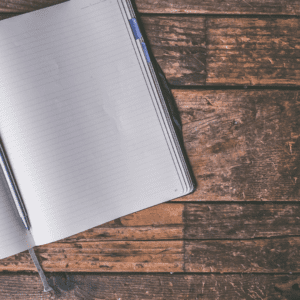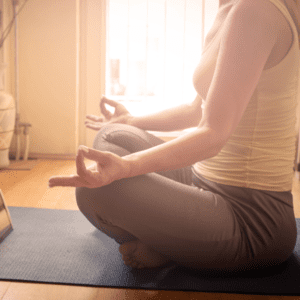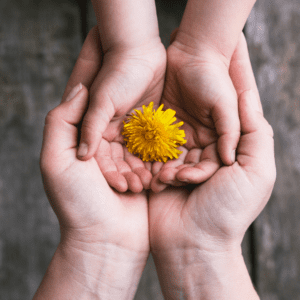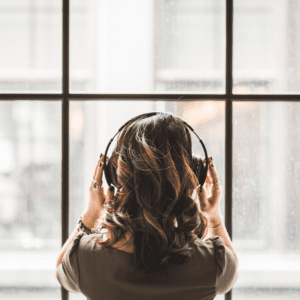Well YYC, it’s been an interesting patch that’s for sure! And if you’ve been a bit disoriented, riding a never-ending emotional rollercoaster and/or a little frozen about the way life has changed so rapidly, you are SO not alone. In fact, you are totally normal. Whatever way that you may be responding is fair, understandable and human — just PLEASE keep respecting social distancing and personal hygiene COVID-19 protocols.
Some of the stress may be spilling over into your relationships with others. When we’re in a state of crisis, even on a subconscious level, we’re in survival mode baby and tapping into that zone can manifest some of the strongest and strangest sides of who we are. According to Meredith Moore, CEO of Greylake Training Solutions, when we perceive a threat or potential threat, our senses, thought processes and hormonal regulation shifts and redesigns around keeping us safe.

And you definitely don’t need to have a bear bounding at you to go into fight, flight or freeze. Less overt and ominous stressors can definitely sneak in and slip us into those modes and activate intense stress responses, making it difficult to tend to your own higher-order needs beyond the basics and those of your loved one(s) during a crisis.
First of all, know that this will not be forever. Secondly, know that we are so proud of how well YYC has stepped up to flatten the curve — it’s truly amazing. Third, you are so going to be ok if you continue to comply with Government and AB Health Standards. And lastly, this can be an opportunity to strengthen and improve your bonds with others!
Here are some ways to do just that and keep communication in your relationship(s) open and healthy during these tense times:

SELF-REFLECTION & HONESTY
Raise your hand if you’ve ever gotten dizzy or felt ill from scrolling through your phone for too long. Mhm. We live in an extremely distracting world filled with crazy amounts of info cramming into our heads way too fast. This can often silence deeper critical thinking and that good ol’ inner voice. In a time when we are dependent on news updates and social media is an automatic coping mechanism, it’s helpful to unplug and tune into some of those thoughts and feelings bumping around your brain, in your heart and your soul.
This takes practice and patience. It might feel uncomfortable and gross at times, but it is so rewarding to let those things breathe.
You can do this by:
- Journaling, by hand (this is important!), for even just 15-30mins to release repressed feelings
- Meditation is also a classic favorite (click here for Yoga Nova studio’s online classes)
- Having a verbal conversation with yourself. Ask yourself what’s up today and give honest answers.
Some of these tactics might feel strange if you’re not used to them but they’re meant to — it means they’re working.

FEEL THINGS OUT
To echo the previous blurb, we’re often repressing A LOT without even knowing. It can take something as dramatic as the COVID-19 pandemic to slow the world down and force us to sit with ourselves in new ways that we simply can’t when we’re in the thick of the daily grind. In the last few years, the mental health trope of relentless positivity and “good vibes only” took social media by storm.
The power of positivity is undeniable. However, an unfortunate side effect of pressuring positivity onto people is that the excessive dismissal of “negativity” can lead to repression and self-denial. It can encourage people into a pattern of stunting their less desirable emotions from fully processing. This leaves them stuck within and can only fester more anxiety and potential depression.
As corny and cheeseball as it sounds, try to set aside time to simply feel — to recognize where emotions are hanging out in your body and what those sensations feel like. It’s not fun to feel the more difficult ones but embracing them and letting them have their moment can be so helpful to relieve an intangible burden. Doing so can often create more room for genuine, not forced, positivity and optimism to flourish!

BE VULNERABLE AS A SOURCE OF STRENGTH
For many, it can be extremely hard to truly open up to others and let them see our clunky, less graceful and raw selves. The deepest layers of our social foundation has some pretty hardcore values around self-composure, success and achievement that can be rather exclusive of, ya know, fucking up and being human.
But things are changing and emotional-wisdom is becoming more socially important. These times are a great opportunity to practice sincere vulnerability with those closest to you. Being vulnerable can manifest differently for each person.
It typically means:
- Being open about your raw, honest thoughts and feelings
- Sharing stories and memories that are meaningful to you
- Trying new things and accepting the risk of failing
- Letting yourself fail as well as succeed
- Asking for or offering help where it’s needed
Being vulnerable is fucking brave. It is self-empowering. And it can be an enormous source of strength and inspiration for yourself and your partner.

ASSERTIVE COMMUNICATION
Sometimes when we’re being vulnerable with our partner, friends or family, we can become brutally honest. Emotions can take the wheel and spur us to say some hardcore, and maybe hurtful things to others, especially in times of high-stress like now. Practicing assertive communication skills can help prevent vulnerable moments from launching into either a defensive display, attack mode or system shut down.
Assertive communication skills involves being honest, clear and direct about your needs, thoughts and feelings while being considerate and validating those of others.
Aggressive communication is often accusatory, malicious and hurtful.
Passive aggressiveness is usually rather indirect, pouty and creates atmospheric tension.
Assertive communication can be tricky to navigate, especially if you’re not accustomed to making your needs a priority, but is a golden way to effectively articulate yourself and to connect with your partner — or people in general — about pretty well anything.
Assertive communication involves:
- Starting statements with “I feel”, “I think”, and “I am” vs. “You made me feel”, “You think”, “You are”, etc. — this is especially beneficial during an argument.
- Using active verbs like “I will”, “I can”, “I want”, “I need” vs things like “coulda, shoulda, woulda”.
- Avoiding using “but” in statements. This can either negate the positives, belittle the meaning of what you have already said or accidentally convert what you are communicating into aggression or passive aggressive communication. Say what ya gotta say and stick to it folks!

ACTIVE LISTENING
We repeat, put down the dang phone. Turn it off. Leave it in another room. Whatever you have to do to be fully present with yourself and with your partner. Of course, that’s with the exception that your phone is the only way to communicate with your partner atm. Either way, steer clear of clicking around through your apps while chatting.
Many of us like to think we can multitask super well and look at a bazillion memes while spending time with other people. But the reality is, you just can’t listen to others to the same depth of when you’re NOT on a mental merry-go-round.
Active listening is when we set our intention to:
- Listen to be educated
- Listen to build trust and bond
- Listen to gain understanding and empathy
- Listen for fun and pleasure!
And this involves allocating your attention directly to the person who is speaking to you. It can be really hard to focus and be a strong active listener when we’re under stress and dealing with a lot of anxiety. It’s well worth practicing though and is such a simple way to insanely improve communication in a relationship.
Times are tough and it’s totally fair if you’re anxious, having a hard time concentrating and bouncing all over the emotional map. Keeping some of these ideas in your back pocket might just come in handy over the next few weeks. And these are only the basics.
If you’re looking to use this time to reconnect with yourself and your bae in new, more meaningful ways, we 100/100 recommend an INCREDIBLE course called Get The Love You Want. This fab at-home program by NYC marriage therapist Vienna Pharaon and Connor Beaton, host of Man Talks Podcast helps you re-pattern your relationship behaviours, explore your communication styles and develop a deeper understanding of your partner — Um, what’s NOT to like? Click here to learn more! PS. You can use the code DATENIGHT to receive $50 off!
Keep things extra spicy by signing up for our new 30 Day Relationship Challenge! Enter your email below for more info!















